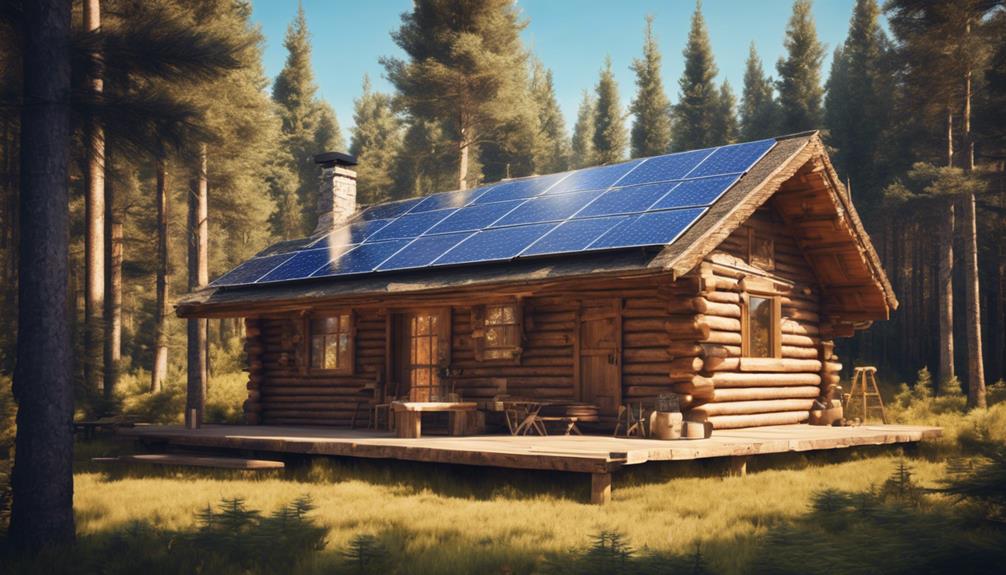When choosing solar panels for your cabin, assess efficiency ratings for optimal energy generation. Prioritize durable panels with premium materials like monocrystalline silicon for longevity. Ensure a meticulous installation process following manufacturer's guidance for peak performance. Consider variations in weather conditions impact panel upkeep and productivity. Evaluate the long-term cost-effectiveness and value solar panels can provide, offering substantial savings over traditional energy sources. These key factors will help you select the best solar panels for your cabin setup.
Efficiency Ratings
When evaluating solar panels for cabins, it's crucial to consider their efficiency ratings, as they directly impact the amount of energy produced and utilized. Efficiency ratings indicate how well a solar panel can convert sunlight into electricity. Higher efficiency panels generate more electricity for the same amount of sunlight. This is essential for cabins, especially in remote areas where maximizing energy output is vital.
Advancements in solar panel technology have significantly improved efficiency ratings over the years. Newer panels can convert sunlight into electricity more effectively than older models. This means that with the same surface area of panels, more electricity can be generated, making them a more attractive option for cabins.
Moreover, higher efficiency panels often require less maintenance. They're designed to be more durable and weather-resistant, reducing the need for frequent checks and repairs.
Additionally, by producing more electricity with the same amount of sunlight, they can help reduce the environmental impact of a cabin by decreasing the reliance on other energy sources. Choosing high-efficiency solar panels can lead to a more sustainable and energy-efficient cabin setup.
Durability and Weather Resistance
Consider the durability and weather resistance of solar panels as key factors when selecting the most suitable option for your cabin's energy needs. The longevity of solar panels is crucial in ensuring a reliable energy source for an extended period.
High-quality materials play a significant role in enhancing durability and weather resistance. Panels constructed with premium materials such as monocrystalline silicon tend to have a longer lifespan and require less maintenance compared to lower-grade alternatives.
Material quality directly impacts the panels' ability to withstand harsh weather conditions. Panels with superior material quality are more likely to be weather-resistant, protecting them from elements like rain, snow, and UV exposure.
Impact resistance is another essential factor to consider, especially for cabins located in areas prone to extreme weather events. Panels designed to withstand impacts from hail or debris ensure the longevity of the system and reduce the need for frequent maintenance.
When selecting solar panels for your cabin, prioritize durability and weather resistance to maximize the efficiency and effectiveness of your off-grid energy solution.
Installation Process and Ease
Ensuring the efficient installation of solar panels at your cabin requires careful planning and strategic execution. Before starting the installation process, consider factors such as the angle of sunlight, potential shading from nearby trees or structures, and the optimal positioning for maximum energy absorption.
To simplify the installation, choose a mounting system that fits your roof type and allows for easy panel adjustment. When installing the panels, follow the manufacturer's instructions meticulously to ensure proper connections and wiring. Utilize waterproof sealing techniques to protect the system from environmental elements.
Installation tips include conducting a site survey to assess the best panel placement, using quality tools for accurate mounting, and testing the system thoroughly before finalizing the setup. In case of any issues during installation, troubleshooting techniques like checking the wiring connections, testing the output with a multimeter, and consulting with a professional can help resolve problems efficiently.
Performance in Various Conditions
For optimal performance in various conditions, understanding how solar panels respond to different weather and environmental factors is crucial.
Solar panels require minimal maintenance to upkeep their efficiency, mainly involving periodic cleaning to remove dirt or debris that may obstruct sunlight absorption.
Energy output from solar panels can vary based on temperature sensitivity and cloud coverage. Extreme temperatures can affect the efficiency of solar panels, with high heat potentially reducing output and cold temperatures impacting performance.
Cloud coverage plays a significant role in energy production, as reduced sunlight exposure during overcast days can lead to lower energy generation. It's essential to consider these factors when evaluating the performance of solar panels in different conditions.
Cost-Effectiveness and Value
Understanding the cost-effectiveness and value of solar panels for cabins involves a detailed analysis of initial investment, long-term savings, and overall return on investment.
Solar panels can provide significant long-term savings by harnessing the power of the sun to generate electricity for your cabin.
While the initial cost of purchasing and installing solar panels may seem high, the return on investment over time can be substantial, especially when considering the rising costs of traditional energy sources.
Conclusion
In conclusion, when selecting solar panels for your cabin, consider the efficiency ratings, durability, installation process, performance in various conditions, and cost-effectiveness.
Just like a sturdy roof protects a house from the elements, quality solar panels will provide reliable energy for your cabin in any weather.
Make sure to choose panels that will stand the test of time and provide value for your investment.
Choose wisely to ensure a sustainable energy solution for your cabin.
